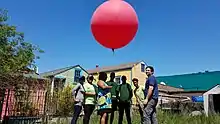Public Lab
The Public Laboratory for Open Technology and Science (Public Lab) is a non-profit organization that facilitates collaborative, open source environmental research in a model known as Community Science.[1][2] It supports communities facing environmental justice issues in a do it yourself approach to environmental monitoring and advocacy.[3] Public Lab grew out of a grassroots effort to take aerial photographs[4][5] of the BP Oil Spill in the Gulf of Mexico in 2010.[6][7] Since then, they have launched a range of projects, including an open source spectrometer,[8][9][10] multi-spectral camera, and low-cost microscope.[11][12]
| Abbreviation | Public Lab |
|---|---|
| Formation | 2010 |
| Type | Non-profit organization |
| Registration no. | 45-2846555 |
| Purpose | Community Science Environmental Justice |
Executive Director | Shannon Dosemagen |
| Janet Haven (Chair), Shelby Ward (Vice Chair), Micah L. Sifry (Secretary), Catherine Bracy, Elaine Garvey, Mike Ma, Gwen Ottinger, Rajul (Raj) Pandya, Christina Xu, | |
| Website | publiclab |
Balloon Mapping

The aerial photography technique Public Lab is best known for involves lifting cameras above an area using tethered helium-filled weather balloons.[13]
Open source environmental monitoring
Public Lab's community develops open source hardware, software, and other open methodologies to democratize environmental monitoring. Recognizing that cost, complexity, and lack of access can prevent communities from playing an active role in documenting environmental problems, the community publishes plans and guides for Do It Yourself monitoring projects that can be made at home.[14][15][16]
References
- "Collaboratively generating more knowledge: Public Lab's approach to citizen science". Creative Commons. 2016-09-07. Retrieved 2019-01-11.
- Breen, Jessica; Dosemagen, Shannon; Blair, Don; Barry, Liz (2019), Glas, René; Lammes, Sybille; de Lange, Michiel; Raessens, Joost (eds.), "Public laboratory:: Play and civic engagement", The Playful Citizen, Civic Engagement in a Mediatized Culture, Amsterdam University Press, 1, pp. 162–174, ISBN 9789462984523, JSTOR j.ctvcmxpds.12
- "Public Lab and Karen Sandler are 2017 Free Software Awards winners". Free Software Foundation.
- "Grassroots Mapping: How You Can Create Aerial Cartography for Under $100, and Use It to Do Good". GOOD. 2011-03-09. Retrieved 2019-01-10.
- Bilton, Nick (2010-06-09). "Taking On the Gulf Oil Spill With Kites and Cameras". Bits Blog. Retrieved 2019-01-10.
- "MIT-based Grassroots Mapping mapping the oil spill with digital camera, kites". Engadget. Retrieved 2019-01-10.
- "If Trump Dismantles the EPA, Use These Kits to Monitor the Environment". Vice.
- "Engadget Expand: Open Source Spectrometers | Make". Make: DIY Projects and Ideas for Makers. 2014-11-08. Retrieved 2019-01-10.
- Hurst, Nathan (2013-03-07). "Analyze This: Design Contest Seeks Your Cheap, Open Source Spectrometers". Wired. ISSN 1059-1028. Retrieved 2019-01-10.
- Gibb, Alicia (2014-12-06). Building Open Source Hardware: DIY Manufacturing for Hackers and Makers. Addison-Wesley Professional. ISBN 9780133373905.
- "Do-it-yourself science is taking off". The Economist. 2017-12-19.
- Glinskis, Emmalina (2018-07-19). "Meet the Community Scientists Shaping the New Environmental Resistance". The Nation. ISSN 0027-8378. Retrieved 2019-01-11.
- Badger, Emily. "DIY Mapping Goes Mainstream". CityLab. Retrieved 2019-01-10.
- Wylie, Sara Ann; Jalbert, Kirk; Dosemagen, Shannon; Ratto, Matt (2014-03-01). "Institutions for Civic Technoscience: How Critical Making is Transforming Environmental Research". The Information Society. 30 (2): 116–126. doi:10.1080/01972243.2014.875783. ISSN 0197-2243.
- Gibney, Elizabeth (2016-03-10). "'Open-hardware' pioneers push for low-cost lab kit". Nature News. 531 (7593): 147–148. Bibcode:2016Natur.531..147G. doi:10.1038/531147a. PMID 26961632.
- Niaros, Vasilis; Kostakis, Vasilis; Drechsler, Wolfgang (November 2017). "Making (in) the smart city: The emergence of makerspaces". Telematics and Informatics. 34 (7): 1143–1152. doi:10.1016/j.tele.2017.05.004. ISSN 0736-5853.